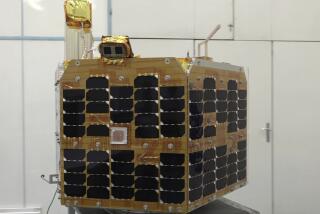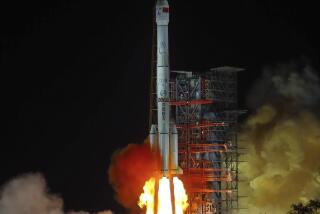An Ambitious China Reaches for the Stars
- Share via
BEIJING — A spacecraft dubbed the Divine Vessel and its lone astronaut blasted off from a remote Gobi desert location early this morning, catapulting China into the elite club of nations that have sent a man into space.
By sending a taikonaut -- a term based on the Chinese word for space -- into orbit, China joined the United States and the former Soviet Union, now succeeded by Russia, as the only countries to successfully launch a manned spaceflight. Those two countries achieved their feats four decades ago.
If all goes well, Yang Liwei and his spacecraft, whose Chinese name is Shenzhou 5, are expected to circle Earth 14 times and, after 21 hours, land in the steppes of the Chinese region of Inner Mongolia.
Today’s launch represents the first step in China’s planned long march into space. Beijing wants to reach for the moon, perhaps with an unmanned mission by 2007 and a lunar station by 2008 -- in time for the Beijing Olympics.
The space program has evoked considerable national pride. But people in this nation of more than 1 billion had to hold their applause after the government canceled a live broadcast of the launch -- to avoid the possibility of televising a disaster if the launch failed or some other accident ensued.
Even though the launch didn’t make Tuesday’s main evening news, state television interrupted its programming this morning to show delayed footage of the liftoff and announce that Yang, 38, had been shot into space.
Chinese President Hu Jintao attended the launch and visited with the taikonaut just before his flight.
“We are waiting for your triumphant return,” Hu said.
Sitting in his spacesuit, Yang, an air force lieutenant colonel with an 8-year-old son, pledged to “live up to the expectations of the motherland and the people.”
Although many Chinese enjoy the prestige that comes with entering the club of space-faring nations, their more immediate concerns are earthbound. China remains a developing nation with a widening gap between rich and poor and a huge unemployment problem.
“In China, many people can’t even solve the basic problem of food and shelter. How can they pay attention to this?” said Yang Li, 24. “I care more about economics. I know nothing about spaceships.”
From the start, the Chinese space program has been shrouded in secrecy and steeped in politics. The father of the program was an American who was accused of being a communist sympathizer during the McCarthy era and was expelled from the United States.
China had planned to send its first man into space in 1999, to coincide with the 50th anniversary of communist rule. But the program was set back by explosions during launches in the mid-1990s.
With the Shenzhou 5, Beijing hopes to show the world that it is much more than a low-tech manufacturing hub. “The Chinese leadership would get a very warm glow from it,” said Brian Harvey, author of a 1998 book on China’s space efforts.
Any muscle flexing may worry critics wary of China’s growing military might and the potential for a new space race. Washington has been reluctant to allow China to join the international space station project. Chinese scientists were denied visas to attend the World Space Congress last year in Houston, a decision some experts say was based on the fear that the Chinese could steal American technology.
“There’s a strong feeling against cooperation. That’s why the Chinese feel, ‘We have to do this ourselves,’ ” Harvey said.
China received some help from the Russians, whose Soyuz craft inspired the design of the Shenzhou. The Russians also trained Yang and other taikonauts in Star City, the cosmonaut training center.
The failure of the American shuttle Columbia, which exploded Feb. 1 on its return to Earth, made Chinese space officials cautious about their own launch.
“I think the Shenzhou 5 has a great chance for success. But [we cannot give a] 100% guarantee for this project. Even advanced countries like America lost its Columbia,” Kuang Dingbo, a space expert at the Chinese Academy of Sciences in Shanghai, said before the launch.
*
Zhang Xiuying of The Times’ Shanghai Bureau contributed to this report.
More to Read
Sign up for Essential California
The most important California stories and recommendations in your inbox every morning.
You may occasionally receive promotional content from the Los Angeles Times.













